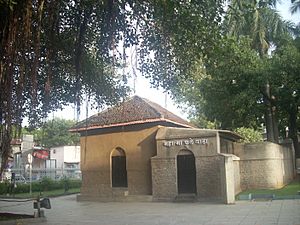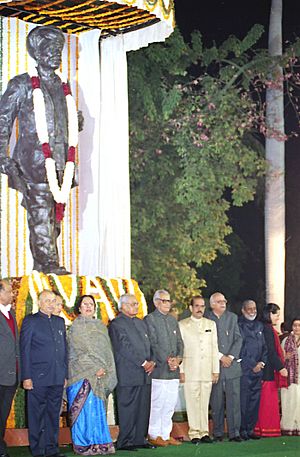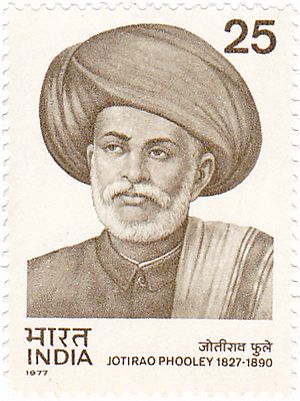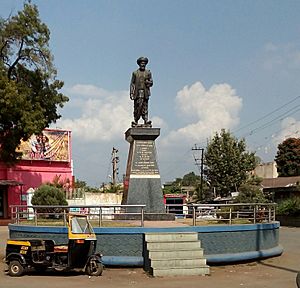Jyotirao Phule facts for kids
Quick facts for kids
Mahatma
Jyotirao Phule
|
|
|---|---|
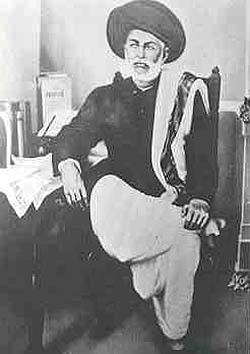 |
|
| Born | 11 April 1827 |
| Died | 28 November 1890 (aged 63) |
| Other names | • Jyotiba Phule • Mahatma Phule |
| Alma mater | • Scottish Mission highschool, Poona (1842) |
|
Notable work
|
• Shetkaryancha Aasud
• Gulamgiri *Satsaar *Ishara *Ballad |
| Spouse(s) | Savitribai Phule |
| Era | 1827- 1890 |
|
Main interests
|
Ethics, humanism, education, social reformation |
|
Influences
|
|
|
Influenced
|
|
Jyotirao Govindrao Phule, also known as Mahatma Jyotiba Phule (born April 11, 1827 – died November 28, 1890), was an important social activist and thinker from Maharashtra, India. He worked hard to remove the unfair practice of untouchability and the caste system. He also put a lot of effort into educating women and people from oppressed groups.
Jyotirao and his wife, Savitribai Phule, were pioneers in women's education in India. They opened India's first school for girls in 1848 in Pune. Jyotirao also started the Satyashodhak Samaj (Society of Truth Seekers). This group aimed to get equal rights for people from lower castes. People from all backgrounds could join this group. Phule is seen as a very important person in the social reform movement in Maharashtra. In 1888, he was given the special title of Mahātmā, which means "great-souled" or "venerable."
Contents
Early Life and Important Moments
Jyotirao Govindrao Phule was born in Pune in 1827. His family belonged to the Mali caste, who traditionally grew fruits and vegetables. In the old varna system, the Mali caste was considered part of the Shudras, which was the lowest-ranking group.
Jyotirao's family was originally from a village called Katgun. They later moved to Pune to find work. His family became known as Phule (meaning "flower-man") because they were very good at growing and arranging flowers.
Jyotirao's mother, Chimnabai, passed away when he was very young. He went to primary school to learn reading and writing. Later, a kind man from his own community saw how smart Jyotirao was. He convinced Jyotirao's father to let him attend the Scottish Mission High School. Jyotirao finished his English schooling in 1847. Like many at that time, he was married young, at age 13, to Savitribai.
A big moment in his life happened in 1848. He went to a wedding of a Brahmin friend. But his friend's parents insulted him, saying he, as someone from a lower caste, should not have been there. This event deeply affected Phule. It made him realize how unfair the caste system was.
Working for Social Change
Education for All
In 1848, when he was 21, Phule visited a girls' school run by Christian missionaries. He also read a book called Rights of Man by Thomas Paine. This book helped him understand the idea of social justice even more. He realized that women and people from exploited castes were treated unfairly in Indian society. He believed that educating them was key to their freedom.
So, in 1848, Phule first taught his wife, Savitribai, to read and write. Then, they started India's first school for girls in Pune. Many people from the upper castes in Pune did not like his work. But many Indians and Europeans supported him. Some conservatives even forced his family to shun them. During this difficult time, their friends Usman Sheikh and his sister Fatima Sheikh gave them a place to stay. They also helped them start a school in their home.
Later, the Phules opened schools for children from castes that were considered "untouchable," like the Mahar and Mang communities. By 1852, they had three schools with 273 girls studying there.
Helping Women and Widows
Phule saw many social problems. He saw how people considered "untouchable" were not allowed to come close to others. He also saw young widows who had to shave their heads and live a life without joy. He decided that educating women was the best way to fight this unfairness.
He started by teaching his wife, Savitribai. He sent her to get trained as a teacher. Together, they opened India's first girls' school in Pune in 1848.
Phule also supported widow remarriage. In 1863, he started a home for pregnant widows from dominant castes. This gave them a safe place to give birth. He also set up an orphanage for abandoned children.
Phule worked to remove the unfairness of "untouchability." He opened his own house and his water-well to people from all castes. This was a big step towards equality.
Ideas on Religion and Caste
Phule believed that the Caste system was created to keep some groups of people in power and others oppressed. He thought that the Vedas, which are important Hindu texts, supported this unfair system. He was one of the first to use the Marathi word dalit (meaning "broken" or "crushed") to describe people who were outside the traditional caste system. This term became popular later.
In 1882, Phule spoke at an education meeting. He asked for help to provide education for all exploited castes. He suggested making primary education required in villages. He also wanted special support for more lower-caste people to go to high schools and colleges.
Satyashodhak Samaj: Society of Truth Seekers
On September 24, 1873, Phule started the Satyashodhak Samaj. This group focused on the rights of women, the Shudras, and the Dalits. Through this society, he spoke out against idol worship and the caste system. The Satyashodhak Samaj promoted logical thinking and said that priests were not needed for religious practices.
Phule created the Satyashodhak Samaj to promote human well-being, happiness, and equality. A newspaper in Pune called Deenbandhu shared the views of the Samaj. People from different religions and castes, including Muslims and Brahmins, joined the group. Phule's own Mali caste members were important leaders and financial supporters of the organization.
Jyotirao Phule's Work and Legacy
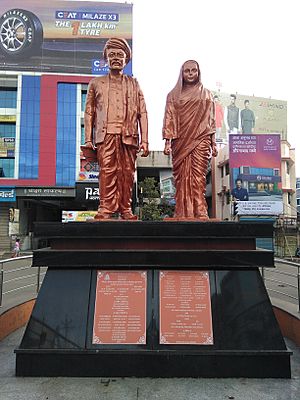
Besides being a social activist, Phule was also a businessman. He owned farmland and worked as a contractor for the government. He supplied building materials for a dam and provided workers for construction projects.
From 1876 to 1883, Phule served as a commissioner (a member of the municipal council) for the city of Poona (now Pune).
Published Works
Jyotirao Phule wrote many books and poems. Some of his important works include:
- Tritiya Ratna, 1855
- Brahmananche Kasab, 1869
- Powada : Chatrapati Shivajiraje Bhosle Yancha, (Life Of Shivaji, In Poetical Metre), June 1869
- Gulamgiri, 1873
- Shetkarayacha Aasud (Cultivator's Whipcord), July 1881
- Satsar Ank 1 & 2, June 1885
- Ishara, October 1885
- Sarvajanik Satya Dharma Poostak, April 1889
His Lasting Impact
Jyotirao Phule was given the title of Mahatma on May 11, 1888, by another social reformer, Vithalrao Krishnaji Vandekar.
Phule greatly inspired B. R. Ambedkar, who was the first law minister of India and a main writer of the Indian Constitution. Ambedkar considered Phule as one of his three main teachers or gurus.
Many places and structures are named after Jyotirao Phule to honor him. These include:
- A large statue at the Vidhan Bhavan (Assembly Building of Maharashtra State)
- Mahatma Jyotiba Phule Mandai in Mumbai
- Mahatma Phule Museum in Pune
- Mahatma Phule Krishi Vidyapeeth (Agricultural University) in Rahuri
- Mahathma Phule Mandai, a big vegetable market in Pune
- Mahatma Jyotiba Phule Rohilkhand University
See also
 In Spanish: Jyotirao Phule para niños
In Spanish: Jyotirao Phule para niños
 | Lonnie Johnson |
 | Granville Woods |
 | Lewis Howard Latimer |
 | James West |


